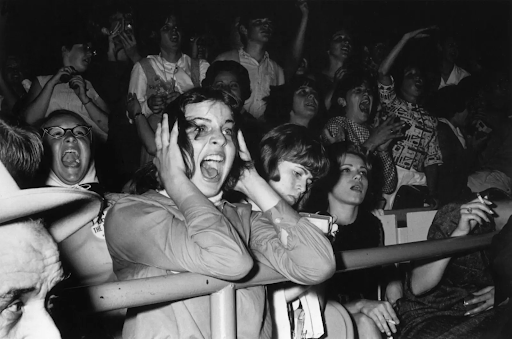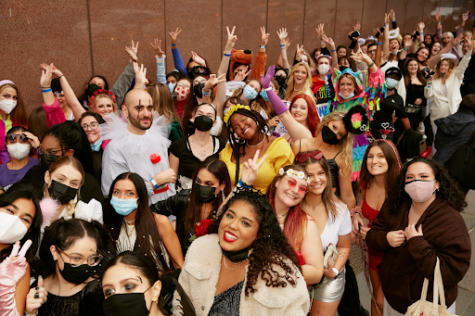Fan Culture and the Misogyny Within

Photo Source: William Lovelace, GETTY IMAGES
November 4, 2022
“If girls grow up in a world where words such as psycho, crazy and hysterical are casually used to describe female enthusiasm, then how does that shape the way those girls get to see themselves?” – Yve Blake, ‘For the Love of Fangirls’
People are constantly searching for a place where they can be around those who share their same interests. For boys, they will have an easier time being accepted and welcomed to fan groups. For girls, they have to prove they are “worthy” enough to be a part of the group. Whether that be memorizing song names of a band they like, memorizing facts about public figures that they claim to like, or constantly being asked if they actually know anything about the subject matter they are claiming to enjoy. Girls of all ages are constantly being tested and challenged to prove they are true fans.
This is not a new issue, women have always been faced with ridicule and shaming when it comes to the things they enjoy. Female Beatles’ fans were looked down upon for screaming at concerts. This phenomenon is what coined the term, “Beatlemania”. The author of “Shout! The Beatles in Their Generation” supplies a quote from an unnamed psychologist that claims all the screaming is because the girls “are subconsciously preparing for motherhood. Their frenzied screams are a rehearsal for that moment.”
Fangirls are often called obsessive, hysterical, and psycho. In fact, if you look up “Why are fangirls…”, these will be your results:

Alternatively, when you search the phrase, “why are fanboys…”, you will receive this result:

Now, neither of the results paint either groups in a good light. However, the language used to describe fanboys is harmless. One of the suggestions even asks the question of why fanboys are so important. There are adjectives placed in front of the word fanboys to signify specific groups rather than just fanboys in general. Every word that follows the statement, “Why are fangirls so…” are negative and detrimental to young girls’ psyches. They are shamed for having interests.

Why should young girls be looked down upon for expressing their emotions towards their favorite artist, band, or actor/actress, when there are grown men starting riots over their favorite team losing? In 2011, the Stanley Cup Final took place between the Boston Bruins and Vancouver Canucks. Game seven ended with a loss for the Canucks and as the buzzer went off for the last time, riots ensued. Cars were lit on fire, people began breaking into random stores and looting, and many were injured. After five hours, the riot ended with 112 businesses damaged or destroyed along with 122 vehicles.
That event is on the more extreme side of things, however, men constantly exhibit this behavior over sporting events. If a woman ever did the same thing, she would be publicly shamed and ridiculed.
Fangirls are the backbone of fandoms. They organize fan projects, they raise money for charities, and their influence can transcend basically anything. In 2015, Project ‘No Control’ was established. One Direction fans created a global social media campaign for the album Four. The fans believe that Four’s previous singles did not represent the album as a whole nor the improvements One Direction had made as a band. They created their own single album covers, called radio stations and requested the song be played, and downloaded it on an unofficial release date. The song eventually gained a number one on the Billboard charts and it became the first non-single to win a Teen Choice Award.
Fangirls need to be taken seriously. Another issue that public figures face (especially music artists), is being seen as inferior because they have a mostly female fanbase. They are not taken as seriously because what should a group of girls know about good music? This narrative is outdated and sexist at its core. As a society, we need to move on and understand the fangirls are important, they are just women enjoying things. They do not deserve to be shamed. Fangirls should be appreciated and uplifted.

“They’re the most honest — especially if you’re talking about teenage girls, but older as well,” he says. “They have that bulls**t detector. You want honest people as your audience. We’re so past that dumb outdated narrative of ‘Oh, these people are girls, so they don’t know what they’re talking about.’ They’re the ones who know what they’re talking about. They’re the people who listen obsessively. They f**king own this s**t. They’re running it.” – Harry Styles on his mostly female fanbase for Rolling Stone Magazine, 2019

Libby Murphy • Nov 7, 2022 at 6:18 pm
What really stood out to me in this article was the concept of “Beatlemania” which was considered to be fangirls’ subconscious preparation for motherhood. This just seems completely outrageous, however, it does demonstrate how misogyny has just changed forms over time. While we don’t consider the enthusiasm of fangirls necessarily a “rehearsal” for motherhood anymore, the fact that they are still labeled “psycho” for it just shows the level of respect for women that never really improved. As this article explains, women really can’t win; they are either crazy for being “obsessed” with an artist, or they are a “fake fan” for having just an interest.
Jack Fahey • Nov 5, 2022 at 8:24 am
I’ve been a Bruins fan for a while, and I remember first hearing about the Canucks riot. It’s certainly a double standard for fanbases like those to reject others for their perceived “obsession” or “scariness.” Hockey, unfortunately, is one of those sports that seems to have a hard time breaking out of its own demographic bubble and opening up to others, including women.